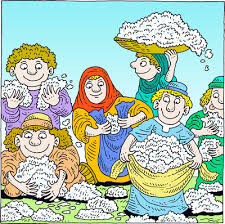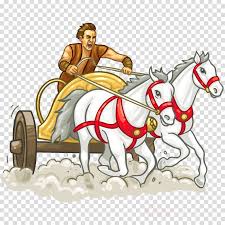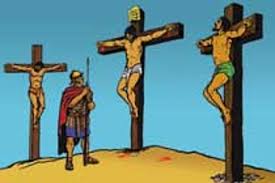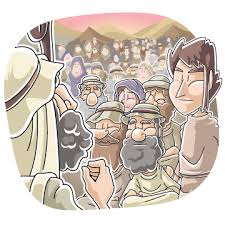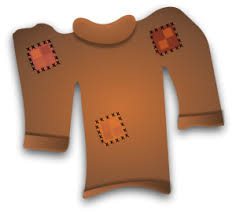Joshua 13:1 – Now Joshua was old and advanced in years, and the Lord said to him, "You are old and advanced in years, and there remains yet very much land to possess."
Welcome back, dear readers! We are studying the book of Joshua, which gives us the details of how Israel partnered with God to gain possession of the Promised Land.

This passage begins with the Lord telling Joshua that he is old. Specifically, he is described as being 'advanced' or 'stricken' in years. What does that signify?
According to the tradition of the Jews, old age consisted of three stages:
- The first stage was from the age of 60-70 and it entailed the commencement of old age. In other words, you weren't quite old yet, but you were getting there!
- The second stage of old age was from 70-80 years old. It was considered the "hoary-headed' age which means the period of white or gray hair (assuming you had hair!). When you hit this stage, you were definitely an 'elder' and as such you were supposed to possess a certain amount of truth and wisdom which you had gained during your life experiences. Because of this, people in this group were treated with respect; their opinions were taken seriously.
- The third stage of old age commenced at 80 and extended until death. This stage was called 'advanced age'. People who made it to this category were also referred to as 'stricken in years'.
What can we determine about the age of Joshua?
Scholars generally consider Joshua to have been about 45 years old (give or take a couple of years) when he left Egypt. This estimation is based on the age of his colleague, Caleb. Then, there were 40 years of wandering in the desert. Once Israel entered the Promised Land, it took 5-7 years for Canaan to be conquered. This would make Joshua 90-92 years of age when Israel's period of rest began. That period of rest is universally accepted as being to 7-8 years long. This would make Joshua 100 years old or, according to the Jews, 'advanced/stricken in years'.

Scripture tells us that Joshua died at the age of 110 (Joshua 24:29). This means that Joshua only had about 10 years to finish his God-given assignment – to both conquer and divide the Promised Land.
Conquering the land and dividing it were two completely different/separate things. So let's stop here and consider Joshua's assignment.
CONQUEST: Obviously Joshua made significant military in-roads into the Promised Land. Under his leadership Israel overthrew a large number of kings/kingdoms along with their fortified cities and strongholds. Their people were destroyed, and possession of their land/houses/goods reverted to Israel.
However, that does not mean that the entirety of the territory was under Israel's control. What Joshua effectively did was to establish a firm foothold for Israel through the center of the land. But he did not remove/exterminate the Canaanites from every portion of the land. As we will discuss shortly, many of these enemies were left in place for future generations of Israelites to overcome.
Overall, it is apparent that Joshua's job was to bring about a significant yet limited conquest of Canaan. He brought Israel across the Jordan, confirmed the covenant of God as the law of the new nation (Joshua 8:30-35), and gave Israel a strong foothold in the land. However, ultimate/complete dominion over the land was left for others to finish.
DIVISION: The second half of Joshua's divine commission was to divide the entire land into different territories and assign them to the individual tribes. These assignments included ALL of the Promised Land – those areas that had been subdued as well as those that were still held by the Canaanites. These unconquered territories were under the control of groups such as the Philistines, Sidonians, Geshurites, etc.
Despite the fact that much of the land was still in control of the Canaanites, the Lord instructed Joshua to get on with the task of dividing and assigning parcels of land to the remaining tribes. This brings up two questions.
First, why do you suppose Joshua hadn't done that yet?
It's possible that Joshua didn't fully understand the plans of God. He may have been under the impression that he was to continue fighting until the entire Promised Land was under the firm control of Israel, and that the land could not be divided until that time.
Or, he may simply have been tired. After all, he was very old and during the years of rest he may have lost some of his initiative for getting the work done.
The second question that comes to mind is this: how can you divide up land when you don't have full control of it?
Although we will look at this question in greater detail, there is a simple answer – once the land was divided and assigned, each individual tribe would be responsible for subduing all the Canaanite kings/kingdoms that lived in their territory.
Of course, there were exceptions to this rule; there were times when the entire nation was called out to fight a common enemy. This was particularly true during the frequent wars with the Philistines.
Joshua 13:2-3 – "This is the land that yet remains: all the regions of the Philistines, and all those of the Geshurites (from the Shihor, which is east of Egypt, northward to the boundary of Ekron, it is counted as Canaanite; there are five rulers of the Philistines, those of Gaza, Ashdod, Ashkelon, Gath and Ekron), and those of the Avvim.
Verses 2-6 make it clear that there were still many strong, fierce and well organized Canaanites living in the land, and all of them were to be defeated by Israel. As the individual tribes began to clear and possess their inheritance, were there any rules they had to follow?
 Yes, there were. Scripture gives us three main commands that Israel was to use when engaging the Canaanites in warfare. They are found at various places in Deuteronomy (chapters seven and twelve), as well as in portions of Joshua:
Yes, there were. Scripture gives us three main commands that Israel was to use when engaging the Canaanites in warfare. They are found at various places in Deuteronomy (chapters seven and twelve), as well as in portions of Joshua:RULE #1: There was to be complete extermination of the nations (people) whenever God delivered the Canaanites up to Israel. This is significant, because it means that people did not die at the whim or pleasure of Israel, but by the divine decree of God. Thus, Israel cannot be accused of slaughtering innocent people.
The signal for extermination was generally an organized, premeditated, unprovoked attack upon the people of Israel. Once a foreign kingdom made such an attack, Israel was to engage them in battle until they were utterly destroyed. God refers to this as 'giving them up' to Israel.
Joshua 11:20 – For it was the Lord's doing to harden their hearts that they should come against Israel in battle, in order that they should be devoted to destruction and should receive no mercy but be destroyed, just as the Lord commanded Moses.
Those who did not attack Israel were generally left alone, until such time as they challenged the people of God.
RULE #2: All traces of idols and idolatry in the conquered territory were to be utterly destroyed.
Deuteronomy 12:1-3 – These are the statutes and rules that you shall be careful to do in the land that the Lord, the God of your fathers, has given you to possess. You shall surely destroy all the places where the nations whom you shall dispossess served their gods. You shall tear down their altars and dash in pieces their pillars and burn their Asherim with fire. You shall chop down the carved images of the gods and destroy their name out of that place.
(See also Deuteronomy 7:5, 7:25 and 12:30). Israel was forbidden to serve the Lord in the same manner as the false gods of Canaan were served. Therefore, all traces of idolatry had to be destroyed so they did not become a snare to Israel. Nothing was to be spared, no matter how impressive, valuable or beautiful it may be.
I don't know about you, but I see a spiritual parallel in this command. At times we are tempted to allow 'small' sins to remain in our lives. For some reason, we often feel like we can control these secret pleasurable sins, however, that is not the case.
That sin may seem innocuous, but in reality, it isn't. It is despicable and deadly. If you allow it into your life, it will sink deep and tangled roots into every aspect of your being.
Before you know it, it will bring forth a harvest of death and destruction (James 1:15). So don't be fooled into thinking you are in control of it. If you have a secret sin in your life, get rid of it immediately, before it becomes a snare to you!
RULE #3: No covenant or treaty was to be made between Israel and any of the nations of Canaan. This not only included peace agreements, it extended to business practices as well as intermarriage of Israelites with Canaanites.
Deuteronomy 7:2-3 – ...when the Lord your God gives them over to you, and you defeat them, then you must devote them to complete destruction. You shall make no covenant with them and show no mercy to them. You shall not intermarry with them, giving your daughters to their sons or taking their daughters for your sons.
Why was it so important for Israel not to make any agreements or marriages with the Canaanites?
Because God knew that if Israel formed bonds or relationships with those who worshiped false gods, they would be influenced to stop serving Him (Deuteronomy 7:4).

This was especially true in the case of marriage. For example, if an Israelite woman married a Canaanite man, she would go live in his house, be immersed in his culture and be expected to serve his idols.
Eventually, it would seem natural to her to serve these gods. Furthermore, any children the marriage produced would be trained to serve false gods as they grew up. Worship of the True God would either cease completely or be corrupted.
Likewise, if an Israelite man married a Canaanite woman, she would slowly introduce false teachings and false worship practices into the home, corrupting the true worship of God (Joshua 23:12-13). Much later in Israel's history, King Solomon fell into this exact sin – his foreign wives tempted him into serving idols.
1 Kings 11:4 - For it came to pass, when Solomon was old, that his wives turned away his heart after other gods: and his heart was not perfect with the LORD his God, as was the heart of David his father.
If intermarriage occurred, Israel would be completely corrupted and/or assimilated into other heathen nations in just a few short generations; they would cease to exist as the peculiar covenant people of God.
Satan would have loved to see that happen, because if Israel ceased to exist, the Messiah could not come and destroy his kingdom. Man would be lost in sin with no hope of redemption; we would be forced to serve Satan for all of eternity.
Looking at the bigger picture, it isn't hard to see that rule #3 was vitally important!
If Israel faithfully observed the commands to destroy all traces of idolatry and refuse to enter into any contracts with the Canaanites, there would have eventually been outbreaks of hostility between Israel and the Canaanites. In turn, this would have caused the Canaanites to attack Israel, who then had the 'green light' to engage them in battle and destroy them. Thus, the entire conquest would have been completed in a very short amount of time.
Unfortunately, rules #2 and #3 were often broken by Israel – mixed marriages were common and idolatry was maintained instead of being wiped out. Because Israel mingled with the heathen, it became almost impossible for rule #1 to take effect, because you couldn't exterminate the heathen without inflicting serious injury on Israel.
Just as God predicted, the heathen that Israel refused to destroy became traps and snares to them, hurting their relationship with God and causing them a lot of pain and grief.
Joshua 13:4-5 - ... in the south, all the land of the Canaanites, and Mearah that belongs to the Sidonians, to Aphek, to the boundary of the Amorites, and the land of the Gebalites, and all Lebanon, toward the sunrise, from Baal-gad below Mount Hermon to Lebo-hamath.
At this point, let's stop and delve deeper into the question of dividing up the land.
 Does it seem at all odd to you that Joshua was instructed to divide up and allocate land that Israel did not even possess yet? Why would God insist upon dividing and assigning the land before it was completely under Israel's control?
Does it seem at all odd to you that Joshua was instructed to divide up and allocate land that Israel did not even possess yet? Why would God insist upon dividing and assigning the land before it was completely under Israel's control?One reason is because generally speaking, people quickly learn to adapt to their surroundings.
For example, at this point, Israel possessed numerous towns and cities. They had a reasonable foothold in the land. They might easily have convinced themselves to be content with what they had. After all, they were now a free people and they were living in the land. They were way better off than they were in Egypt. Why go back to war? Why not just settle for what they had?
Of course, 'settling for what they had' was NOT part of God's plan. He did not intend for his people to 'make do' with limited space and resources. His plan was for Israel to fully possess all the land and to fully enjoy all the 'milk and honey' the land provided.
To settle for second best was to reject or cast aside the awesome blessings that God desired to give his people. So, the allocation of land which they did not control was a kind of incentive or 'earnest payment'. It encouraged each tribe to seek after and obtain all that God had in store for them.
Another reason God assigned Israel unconquered territory was to keep them dependent upon him. As we mentioned, Israel had already obtained numerous blessings from God. Based on their current prosperity, they might have fallen away from serving the Lord and began trusting in their own wisdom and might.
By forcing them to continue in various battles, God kept the next generation of Israelites faithful to him. This also provided them with military practice.

Thirdly, it was necessary to divide the land at this particular time, because the current generation of people had solemnly promised to do whatever Joshua instructed them to do (Joshua 1:16-8).
And they were true to their word. They had whole-heartedly followed Joshua for years now. They followed him across the Jordan, they followed him during their many wars, and they followed him in serving the Lord. It would be very natural/easy for them to accept his division of the land.�By contrast, if the land was not divided until after the death of Joshua, future generations would have been much less inclined to agree or accept the decision of any new leader, because that leader would not possess the same divine authority that Joshua did.
Joshua 13:6 - ... all the inhabitants of the hill country from Lebanon to Misrephoth-maim, even all the Sidonians. I myself will drive them out from before the people of Israel. Only allot the land to Israel for an inheritance as I have commanded you.
As we discuss the division of the land, we should keep a few things in mind:
- God always keeps his promises.
- His will always prevails.
- He always sees the end or outcome of a matter before it ever begins:
Isaiah 46:9-10 - I am God, and there is none else; I am God, and there is none like me, declaring the end from the beginning, and from ancient times the things that are not yet done, saying, My counsel shall stand, and I will do all my pleasure:
For example, when God commanded the land to be divided up between the tribes, he saw the land as already belonging to Israel even though the tribes did not have possession of all of it at that moment. In his eyes, it was a 'done deal' because he always keeps his promises and his will always prevails.
All Israel needed to do to claim that promise was to believe God and step out in faith. As they did, God would be right there to 'drive out' the Canaanites before his people. God even gave them an extra assurance that this would be the case. With God fighting on their side, victory was assured!
Thus, Israel's next steps were very clear:
- Divide the land.
- Move forward in faith to conquer the land.
- Stick to the three rules.
- Stay close to God (keep the covenant).
Both present and future generations of God's people could be assured of success by sticking to this plan.
In fact, so can you and I. God has not changed; when he promises you something, you can be 100% sure that he is ready, willing, and able to deliver. All you need to do is step out and claim your promise by faith. Remember, God already sees that thing as yours!
Let me offer you some encouragement and relief:
In this post, we looked at three rules that applied to the children of Israel: Completely annihilate the Canaanites at the command of God, do not enter into any covenants with the Canaanites, and utterly destroy everything associated with idol worship.
Do these rules apply to God's people in this generation?
Well obviously, we don't annihilate people! Instead, we need to introduce them to Jesus! Because it is the will of God for all people to find salvation, we should do everything within our power to rescue sinners from the clutches of Satan by introducing them to the gospel. There are many ways to participate in this – personal witnessing, giving out copies of the gospel and supporting radio/TV ministries are just a few.
As far as rule number two, Christians today should be very careful about entering into covenants/legal contracts with unbelievers. This is especially true in the realm of marriage.
If a Christian marries an unbeliever, they have opposing views in nearly every aspect of life. They will not agree on issues such as how to raise the children, how to properly handle the family finances, what morals are acceptable in the home, or which religious practices are correct. Essentially, such a marriage could be described as a divided house, which is always in danger of falling apart (Matthew 12:25).
If you are currently single, I strongly encourage you to hear from God before you enter into a marriage relationship. You won't regret taking the time to find a spouse who also serves God.
By contrast, those who foolishly enter into an unequally yoked relationship (II Corinthians 6:14) can expect heartache and trouble.
However, if you are currently married to an unbeliever, do not give up hope! Ask the Lord how to best relate to your unbelieving spouse. Let the light of Christ shine in your marriage and believe God for the salvation of your family. Remember, nothing is impossible for God!
Let me offer you some strength:
In today's post, we noted that God did not want his people to settle for second best. He assigned unconquered territory to Israel as an incentive for them to actively pursue all the blessings (land, resources, etc) that he had in store for them.

What about you and me? God hasn't changed; he has many gifts available to his children and he wants you to have all the good things he has ordained for you. He takes great pleasure in giving you all that you need and much of what you want. When was the last time you got something new from your heavenly Father?
When you ask God for a gift don't think just in terms of temporal blessings. Those are nice, but they have no lasting value – they will pass away.
By contrast, the spiritual gifts God gives are of infinite value/worth. For this reason, he won't give them to people who don't value and desire them (to do so would be to disrespect the blessing). However, I want to emphasize that God is not stingy; he wants to give us spiritual gifts more than we want to receive them!
If you want to receive a spiritual gift from God, spend time in his presence through praise and worship. Ask for a gift in faith, believing that you will receive it from him.
Mark 11:24 - Therefore I say unto you, whatever things you desire, when you pray, believe that you will receive them, and you shall have them.
Here is something to consider: Has God placed you in a situation where you need to conquer something? Perhaps he has done so as an incentive to you. Maybe he wants you to do a mighty work or receive a special blessing that you wouldn't otherwise seek unless you had a need.
In any case, remember that God's gifts are received by faith, through relationship with him. If you desire a spiritual gift from him, spend time in his presence and ask in faith. Then thank him for the gift and look for the manifestation of it in your life.











